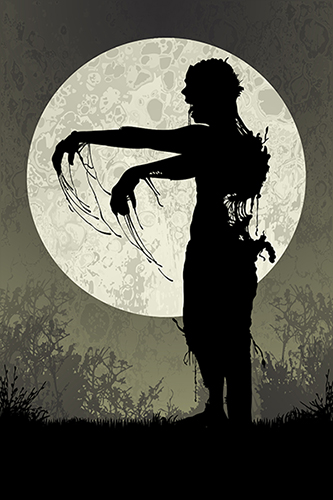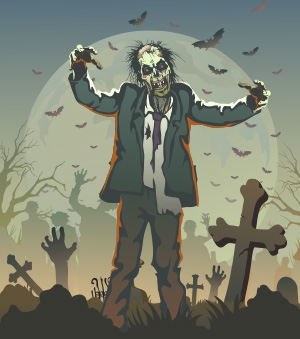Zombies and Resurgence: A Halloween Analysis
 Zombies are known as the living dead, creatures that arise from their graves, eat human flesh, and do other disgusting stuff just to stay semi-alive. Even though this is a well-documented phenomenon (at least if you believe the ever-expanding zombie literature), relatively little is known about the behavioral mechanisms that underlie this resurrected behavior of Zombies. Until now.
Zombies are known as the living dead, creatures that arise from their graves, eat human flesh, and do other disgusting stuff just to stay semi-alive. Even though this is a well-documented phenomenon (at least if you believe the ever-expanding zombie literature), relatively little is known about the behavioral mechanisms that underlie this resurrected behavior of Zombies. Until now.
Resurgence is a relatively well-researched behavioral phenomenon (for a research sampling, see, e.g., the recent special issue of the Mexican Journal of Behavior Analysis on this topic). It involves first reinforcing one response, which we’ll call A. After a period of reinforcing A, that response is extinguished (reinforcement is discontinued) and a second response, B, is reinforced. When Response B subsequently is extinguished, Response A transiently recurs before diminishing to zero (responding is transient because Response A is not reinforced; were it reinforced, of course, it would be likely to continue). The recurrence of Response A defines resurgence. As several of the articles in the aforementioned special issue (and many others published in other journals) attest, resurgence has provided a model for the relapse of problem behavior such as drug or alcohol addiction, as well as a model for creativity and problem solving. And now a model for Zombie behavior. How cool is that?
Zombies, before they were zombies, were pretty much normal Josephs and Josephines (these, by the way, are meant to be the French versions, masculine and feminine, of “Joe.” I use these because, as is well known, the concept of zombies (pardon the pun) arise from Voodoo culture and everyone associates  Voodoo with Haiti, where a French dialect is spoken). So, these to-be-zombies are going along behaving as people do - walking, eating, and all the other stuff that goes along with the homo sapiens label - until one day for whatever reason they up and die. Dying is the ultimate extinction (as Skinner puts it, more or less, in Science and Human Behavior, death is the reduction in the probability of a response to zero). So what was is no more. Believing in the afterlife as many voodoo practitioners do, one can assume that some kind of alternative behavior (Response B in the above example) begins at their earthly demise. Because behavior does not occur without reinforcement, we can further assume that whatever unearthly behavior was going on was maintained by some type of reinforcement contingency. But how, you now ask, can behavior be maintained if someone is dead? Well, it can’t, or at least not for long. So what happens as the dead behavior, B, is extinguished? Why, previously reinforced behavior recurs, of course. And what was previously reinforced than wandering around and trying to find unusual stuff to eat.
Voodoo with Haiti, where a French dialect is spoken). So, these to-be-zombies are going along behaving as people do - walking, eating, and all the other stuff that goes along with the homo sapiens label - until one day for whatever reason they up and die. Dying is the ultimate extinction (as Skinner puts it, more or less, in Science and Human Behavior, death is the reduction in the probability of a response to zero). So what was is no more. Believing in the afterlife as many voodoo practitioners do, one can assume that some kind of alternative behavior (Response B in the above example) begins at their earthly demise. Because behavior does not occur without reinforcement, we can further assume that whatever unearthly behavior was going on was maintained by some type of reinforcement contingency. But how, you now ask, can behavior be maintained if someone is dead? Well, it can’t, or at least not for long. So what happens as the dead behavior, B, is extinguished? Why, previously reinforced behavior recurs, of course. And what was previously reinforced than wandering around and trying to find unusual stuff to eat.
 But, there is a problem. Zombies walk weirdly, and they eat human flesh. This isn’t the behavior we have seen in real life. So, if it is resurgent behavior it isn’t exactly like Response A as described above. Here’s my hunch as to what is going on. No one has examined how really similar resurgent behavior is to the originally reinforced response. It is a research question to be answered, but I will suggest here that there are some qualitative differences between the original and resurged response. This is admittedly going out on a limb, but it is at least a somewhat educated speculation about what happens in resurgence. At least give me a little poetic license here to make my model work.
But, there is a problem. Zombies walk weirdly, and they eat human flesh. This isn’t the behavior we have seen in real life. So, if it is resurgent behavior it isn’t exactly like Response A as described above. Here’s my hunch as to what is going on. No one has examined how really similar resurgent behavior is to the originally reinforced response. It is a research question to be answered, but I will suggest here that there are some qualitative differences between the original and resurged response. This is admittedly going out on a limb, but it is at least a somewhat educated speculation about what happens in resurgence. At least give me a little poetic license here to make my model work.
It’s also the case that the to-be zombie has been stuffed in the ground and left there to rot, so it may be unsurprising that they walk haltingly and don’t have much to say. As for the eating of human flesh, it isn’t hard to imagine either that taste buds have been affected by their forced subterranean sojourn (or maybe it is just a generalization gradient because it has been said that – and I certainly would not know - human flesh tastes like chicken). So, we end up with resurged behavior that resembles its previous-life forms of walking and eating, but altered as a result of interment-induced insults to the body. A simple and elegant account of the perplexing problem of Zombie behavior. Or so I would argue.
Happy Halloween!



